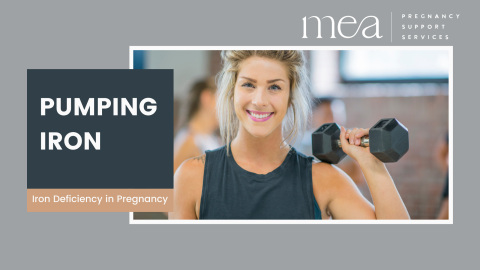
No, we’re not talking about weightlifting, rather, we are talking about the mineral iron.
What is iron and why is it important?
Iron is a mineral that plays an important role in the formation of red blood cells. Red blood cells are responsible for transporting oxygen throughout our body.
What contributes to low iron in pregnancy?
During pregnancy, a woman’s blood volume increases by 20-30%. As blood volume increases, so does the production of red blood cells and this results in an increased demand for iron.
In pregnancy – (especially the first trimester) – many women suffer from nausea and vomiting. This can lead to an inability to eat and/or absorb the iron that their body and their baby needs.
Let’s Pump it up!
How you can increase your iron levels:
There are two main ways you can increase you iron levels: food and supplementation.
The best place to start is food! I am biased because I love to eat, but the truth is we all need to eat, every day, multiple times a day. It’s also worth noting that food will have fewer side effects than supplements.
There are two main categories of iron found in food: heme iron and non-heme iron. This is a scientific way of saying iron that comes from animal sources is heme iron and iron that comes from plant sources is non-heme iron.
Heme iron is easiest for your body to absorb; examples include foods like eggs, beef, pork, and poultry. Non-heme iron includes foods like beans, nuts, vegetables, and (oddly enough) black strap molasses. Non-heme iron can be harder for the body to absorb. However, there are two strategies that can help. One, pair animal and plant sources of iron together to increases the absorption of the plant source iron. Two, consume non-heme iron foods with vitamin C. Doing so helps increase absorption.
A seasonal and delicious example would be chili, which often contains ground meat, beans, and tomatoes. Ground meat provides the animal-based iron source, beans the plant-based iron source, and tomatoes the vitamin C.
Another way to increase iron levels is to take a supplement. In pregnancy it is recommended that all women take a prenatal vitamin with 16 to 20 mgs of iron. Some women may require more iron than that; however, that is an important discussion to have with your health care provider.
Iron is very important, especially in pregnancy! Eating a healthy diet with animal-based iron sources, plant-based iron sources, and vitamin C will increase your likelihood of maintaining healthy iron levels. If you are concerned about your iron levels talk to your doctor about supplementation and next steps.
By: Adriane, RN ~ Prenatal Educator
References:
Anemia and Pregnancy - Hematology.org
Managing Iron Deficiency - Unlock Food
Eating for a Healthy Pregnancy - Unlock Food
How To Get More Iron From Food - Unlock Food
